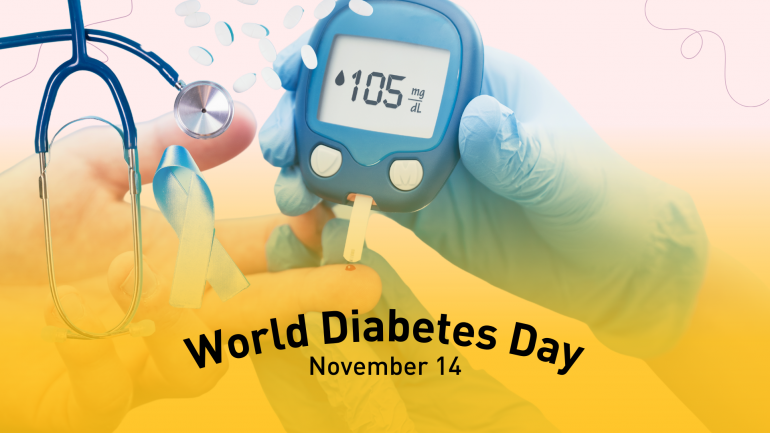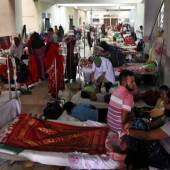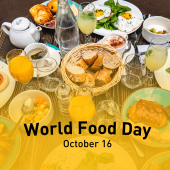World Diabetes Day

Every year, World Diabetes Day is celebrated on November 14. The main purpose of this day is to raise awareness and provide education concerning a disease that affects over 400 million adults internationally.
Diabetes is a disease that occurs when blood glucose, also called blood sugar, is too high.
Blood glucose is the main source of energy and comes from the food eaten. Insulin, a hormone made by the pancreas, helps glucose from food get into cells to be used for energy.
Diabetes is a major cause of blindness, kidney failure, heart attack, stroke and lower limb amputation.
World Diabetes Day
World Diabetes Day was established in 1991 by the International Diabetes Federation with support from WHO in response to growing concerns about the health and economic threat posed by diabetes.
World Diabetes Day commemorates the birthday of Sir Frederick Banting who co-discovered insulin in 1922. Today, this day is observed in 170 countries and territories.
Diabetes Day became an official United Nations Day in 2006.
In 2007 UN General Assembly adopted resolution 61/225 designating 14 November as World Diabetes Day. The document recognized “the urgent need to pursue multilateral efforts to promote and improve human health, and provide access to treatment and health-care education.”
The resolution also encouraged Member States to develop national policies for the prevention, treatment and care of diabetes in line with the sustainable development of their healthcare systems.
World Diabetes Day is the world's largest diabetes awareness campaign reaching a global audience of over 1 billion people in more than 160 countries. The campaign draws attention to issues of paramount importance to the diabetes and keeps diabetes firmly in the public and political spotlight.
In 2022, World Diabetes Day is celebrated with the theme “education to protect tomorrow,” the International Diabetes Federation has launched a global survey to explore the levels of access that healthcare professionals and people living with diabetes have to diabetes education.
Diabetes: Facts
Diabetes, or diabetes mellitus, refers to a group of metabolic disorders that result in chronic high blood sugar levels.
The exact cause of most types of diabetes is unknown. In all cases, sugar builds up in the bloodstream. This is because the pancreas doesn't produce enough insulin. Both type 1 and type 2 diabetes may be caused by a combination of genetic or environmental factors.
Diabetes is a chronic disease, which occurs when the pancreas does not produce enough insulin, or when the body cannot effectively use the insulin it produces. This leads to an increased concentration of glucose in the blood (hyperglycinemia).
Type 1 diabetes (previously known as insulin-dependent or childhood-onset diabetes) is characterized by a lack of insulin production.
Type 2 diabetes (formerly called non-insulin-dependent or adult-onset diabetes) is caused by the body’s ineffective use of insulin. It often results from excess body weight and physical inactivity.
Gestational diabetes is hyperglycinemia that is first recognized during pregnancy.
It is estimated that 537 million people are currently living with diabetes all over the world. By 2045, projections show this number rising to some 783 million diabetics globally.
Talking can help you think differently about your diabetes too. Relating to other people with diabetes could bring positive changes and help you work through daily challenges, such as feeling anxious about blood sugar levels, or trying to find the right time to take injections.
A recent survey says China is one of the countries with the highest number of diabetics worldwide, with around 141 million people suffering from the disease. By the year 2045, it is predicted that China will have around 174 million people with diabetes.
Around 10.5 percent of the global adult population suffered from diabetes in 2021. By the year 2045, this number is expected to rise to over 12 percent.
Diabetes: Care and Prevention
To observe this day, many healthcare professionals, companies, celebrities, and politicians host a variety of activities to spread awareness about diabetes.
A healthy diet, physical activity and avoiding tobacco use can prevent or delay type 2 diabetes.
In addition, diabetes can be treated and its consequences avoided or delayed with medication, regular screening, and treatment for complications.
Health is wealth! So, let us raise awareness of the rising threat of diabetes around the world.
Radio Veritas Asia (RVA), a media platform of the Catholic Church, aims to share Christ. RVA started in 1969 as a continental Catholic radio station to serve Asian countries in their respective local language, thus earning the tag “the Voice of Asian Christianity.” Responding to the emerging context, RVA embraced media platforms to connect with the global Asian audience via its 21 language websites and various social media platforms.














